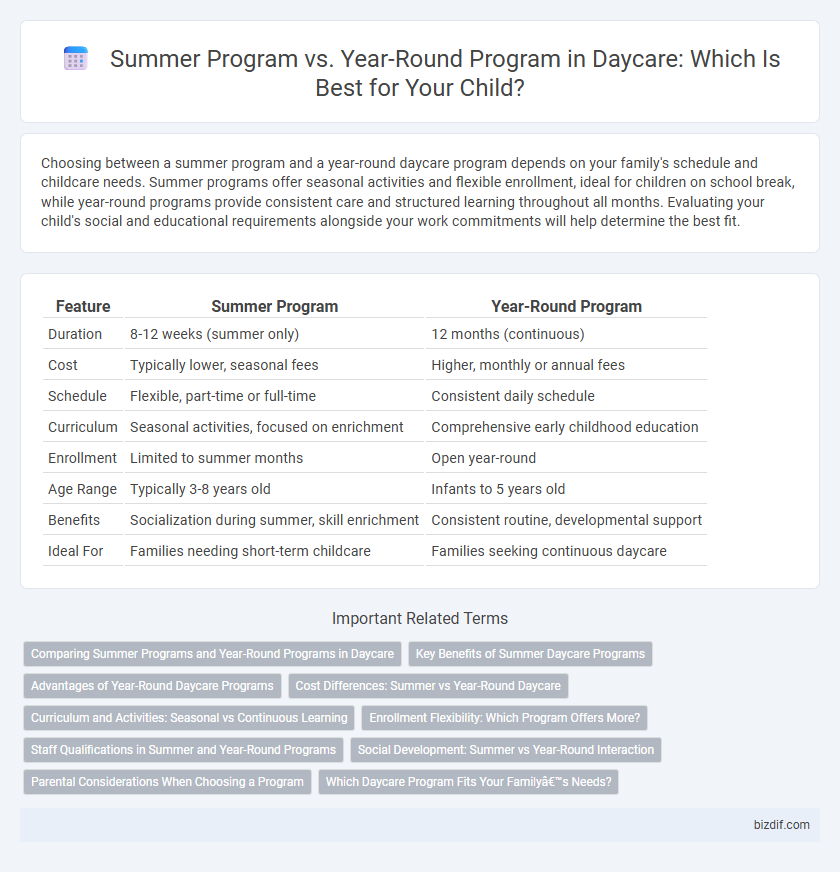Choosing between a summer program and a year-round daycare program depends on your family's schedule and childcare needs. Summer programs offer seasonal activities and flexible enrollment, ideal for children on school break, while year-round programs provide consistent care and structured learning throughout all months. Evaluating your child's social and educational requirements alongside your work commitments will help determine the best fit.
Table of Comparison
| Feature | Summer Program | Year-Round Program |
|---|---|---|
| Duration | 8-12 weeks (summer only) | 12 months (continuous) |
| Cost | Typically lower, seasonal fees | Higher, monthly or annual fees |
| Schedule | Flexible, part-time or full-time | Consistent daily schedule |
| Curriculum | Seasonal activities, focused on enrichment | Comprehensive early childhood education |
| Enrollment | Limited to summer months | Open year-round |
| Age Range | Typically 3-8 years old | Infants to 5 years old |
| Benefits | Socialization during summer, skill enrichment | Consistent routine, developmental support |
| Ideal For | Families needing short-term childcare | Families seeking continuous daycare |
Comparing Summer Programs and Year-Round Programs in Daycare
Summer programs in daycare focus on seasonal activities and often emphasize outdoor play and thematic learning tailored to the summer months, promoting social interaction and physical development during school breaks. Year-round programs offer continuous care with a consistent curriculum that supports steady academic and social progress, providing stability for working parents throughout the entire year. Choosing between the two depends on family schedules, children's developmental needs, and preferences for flexible versus structured childcare options.
Key Benefits of Summer Daycare Programs
Summer daycare programs provide concentrated opportunities for children to engage in seasonal activities, enhance social skills, and prevent summer learning loss. These programs often feature thematic curriculum, outdoor play, and field trips that enrich children's developmental experiences beyond the traditional classroom setting. Year-round programs offer consistent childcare, but summer programs uniquely emphasize recreational learning and peer interaction tailored to the summer season.
Advantages of Year-Round Daycare Programs
Year-round daycare programs offer continuous childcare without extended breaks, providing consistent routine and stability essential for child development. These programs support working parents by aligning with non-traditional work schedules and minimizing disruptions caused by seasonal closures. Access to year-round care enhances early learning opportunities and socialization, promoting steady cognitive and emotional growth.
Cost Differences: Summer vs Year-Round Daycare
Summer daycare programs typically have a higher hourly rate but operate fewer weeks, resulting in varying overall costs compared to year-round daycare, which offers consistent monthly fees throughout the year. Families opting for year-round programs benefit from predictable budgeting and may receive discounts for continuous enrollment, while summer programs can incur additional expenses due to specialized activities and shortened schedules. Evaluating total annual costs, including possible holiday closures and program variations, helps parents determine the most cost-effective option for their childcare needs.
Curriculum and Activities: Seasonal vs Continuous Learning
Summer programs in daycare emphasize seasonal themes and outdoor activities like water play and nature exploration, fostering engagement through varied, time-specific content. Year-round programs offer continuous learning with a structured curriculum that builds skills progressively across all subjects, ensuring consistent development without interruption. Both approaches provide valuable educational experiences, with summer programs enhancing creativity through seasonal variation and year-round programs strengthening academic foundations through steady, cumulative instruction.
Enrollment Flexibility: Which Program Offers More?
Year-round daycare programs provide greater enrollment flexibility by accommodating families seeking consistent childcare throughout all seasons, while summer programs typically offer limited enrollment tied to specific months. Year-round options allow parents to adjust schedules based on changing needs, supporting ongoing child development and routine stability. Summer programs are ideal for families needing temporary childcare but lack the adaptable enrollment periods characteristic of year-round care.
Staff Qualifications in Summer and Year-Round Programs
Staff qualifications in summer programs often emphasize skills in outdoor activities and seasonal safety certifications to cater to the unique needs of warmer months. Year-round daycare programs require educators with comprehensive training in early childhood development, including credentials in health, nutrition, and continuous curriculum planning. Both program types benefit from staff holding certifications in CPR, first aid, and child behavior management to ensure child safety and quality care.
Social Development: Summer vs Year-Round Interaction
Year-round daycare programs offer consistent social development opportunities through daily interaction with diverse peer groups, fostering long-term relationship skills and emotional growth. Summer programs provide intensive but shorter bursts of social engagement that encourage adaptability and new social experiences in a dynamic environment. Children in year-round programs often benefit from gradual social skill building, while summer programs emphasize rapid socialization and flexibility.
Parental Considerations When Choosing a Program
Parents often evaluate summer and year-round daycare programs based on factors like continuity of care, child development benefits, and scheduling flexibility. Summer programs provide a seasonal break that aligns with school vacations, appealing to families seeking respite without long-term commitments. Year-round programs ensure consistent learning and socialization opportunities, which many parents prioritize for maintaining routine and supporting steady growth.
Which Daycare Program Fits Your Family’s Needs?
Choosing between a summer program and a year-round daycare depends on your family's schedule, childcare needs, and child's development goals. Summer programs offer flexible, short-term care with seasonal activities ideal for school-aged children during breaks, while year-round programs provide consistent, structured care and learning opportunities throughout the entire year. Evaluating factors such as work schedules, educational priorities, and socialization needs helps determine which daycare program best supports your family's lifestyle and your child's growth.
Summer program vs year-round program Infographic

 bizdif.com
bizdif.com